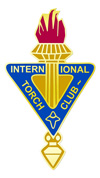
Meeting Minutes
Torch Club of the Fox Valley
11 February 2016
Atlas Coffee Mill & Café
Notes taken by: Jude Kuenn, secretary
Attendees: Karen Bachhuber, Jim Baumbach, Nancy Bodway, Marcia Debbink, Mary Flanagan, Jean Hedges, Walt Hedges, Jean Jepson, Barbara Kelly, Bill Kelly, Jude Kuenn, Mary Poulson, Richard Schoenbohm, Katie Shaw, Webb Shaw, Bob Swain, Helen Thiel, Peter Thiel, Scott Valitchka, Donna Weis, Sofia Wilson
Guests: none
BUSINESS MEETING
Meeting called to order at 6:35pm.
- Guest introductions: none.
- Minutes from 1/14/16 meeting were accepted, motioned and approved.
- Treasurer’s report: balance at 2/05/16 was $2,084.36. Payment of $1,100.00 was made for IATC dues; there were no receipts. Report was accepted, motioned and approved.
- Old Business: none.
- New Business:
A. Vote on new member: Sofia was welcomed to the Club.
B. 2016 IATC Convention ‘Come Discover Columbus’ will be June-23-26, in Columbus, OH. Let Richard or Barbara know if you’re thinking of attending and would be willing to be our delegate.
C. Other new business:
1. 2016 Gold and Silver IATC Torch Award nominees are due 3/31/16. Silver is for exemplary service at a club level, with 5 years’ minimum membership. A Gold candidate has served locally, regionally and at an association level, with 10+ years’ membership. Ask Richard or Barbara for more details or if there have any questions. Torch Club of the Fox Valley has received both awards: Gold for Len Weis and Silver for Al Button and Barbara Kelly.
2. See Richard’s 1/19/16 email recapping his menu discussion with Sue at Atlas. There were no printed menus for tonight’s meeting. Richard will suggest a short list be available for March.
3. Mary Poulson shared 2/17/16 Noonhour Philosopher’s speaker will be Jesse Hefferman. His topic: ‘Developing a Culture of Recovery’. He is a professional recovery coach and consultant.
4. Richard and Scott Valitchka reminded everyone “Transcending Time – A Survey of Lino Tagliapietra” exhibit ends 2/14/16. Bergstrom-Mahler Museum of Glass members are invited to attend a closing reception Sunday from 11:3am-1pm. Jan Smith will host a final walk-through of Lino’s pieces.
5. On a sad note, Cam Maurice lost her husband John 2/07/16. Our heartfelt sympathy is extended to her. - Everyone was invited to peruse the book exchange table. Bill Kelly offered to box books without a new home to donate to the AUUW book sale.
Business segment adjourned at 6:50pm for dinner.
Webb Shaw presented “Innovation in the Middle Ages”
The Middle Ages can be defined as the period between the fall of the Western Roman Empire to the beginning of Renaissance, roughly 476 to 1517. One historian described the period between the 10th and 13th centuries as "one of the great inventive eras of mankind."
Medieval engineers exploited water-driven mills far more than was done in the ancient world. One monastic order alone, the Cistercians, constructed a watermill in each of its 742 monasteries across Europe. In England around the time of the Norman Conquest (1066), there were 5,624 watermills in use, creating a strong economic force. Often built as partnerships, water mills served a variety of functions, from tanning to paper manufacture. The Cistercian monks even used their watermills to refine the science of metallurgy, including the use of the blast furnace.
Water power was a main energy source, but medieval engineers also built windmills.
Europe also underwent an agriculture revolution. Crop yields multiplied thanks to the heavy plow, and the three-field crop rotation system was invented.
Until the late 1200s, clocks were driven by waterwheel. An early focus of clock-builders was tracking the heavenly bodies for astrological purposes. A particularly elaborate astronomical clock is credited to Italian Giovanni di Dondi. His mechanical clock, which he called the "astrarium," included detailed tracking of the moon and planets. Early time-keeping clocks were large mechanisms that rang bells throughout the day to signify liturgical events, such as calling brethren to prayer at a monastery.
Until the advent of mechanical clocks, temporal hours, a unit of time which varied depending on the season, had twelve ‘hours fit between sunrise and sunset. Around 1370, King Charles V of France decreed that Paris’s churches should chime at the equal hours, the same as three royal clocks he had had built.
![]()
The quadrant came into wide use for marine navigation during the 1400s. With the quadrant, sailors could calculate latitudes. In 1730, the sextant was invented.
The Middle Ages were ripe with innovative concepts, as well as innovative technologies. For example, movable type became a commercial reality thanks to Johannes Gutenberg, a German printer. He invented a new sort of alloy for casting type. His 1455 printed Bible made books available to more folks. In 1452, Italy opened the first public library.
The Magna Carta, signed in 1215, was created because of disagreements between King John and his English barons about the rights of the King. ‘The Great Charter’ established for the first time the principle that everyone, including the king, was subject to the law.
The role of Parliament and representative democracy continued to be shaped during that century, culminating with King Edward I's Model Parliament of 1295. Today, part of government’s duties are making laws and setting taxes.
Medieval inventions in the medical arena were:
* eyeglasses – exact origins unknown, but by late 13th century were considered common;
* cleaning wounds – antiseptic and anesthesia;
* anatomy – a 1316 physician wrote a text on the human body;
* quarantine – a quarter of the population died due to the Black Death during the 1300s. The concept of quarantine was introduced in 1377 to control spreading epidemic.